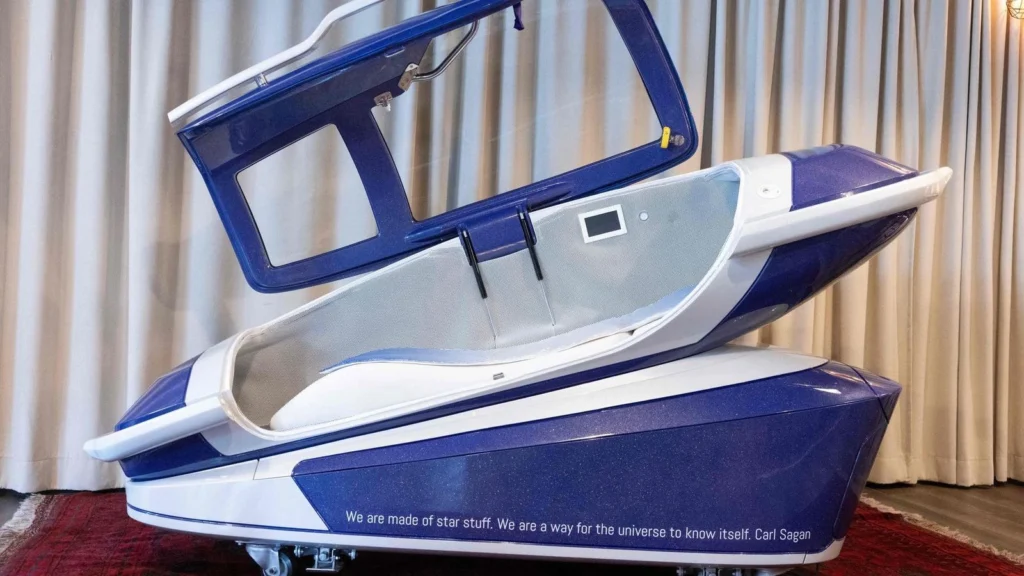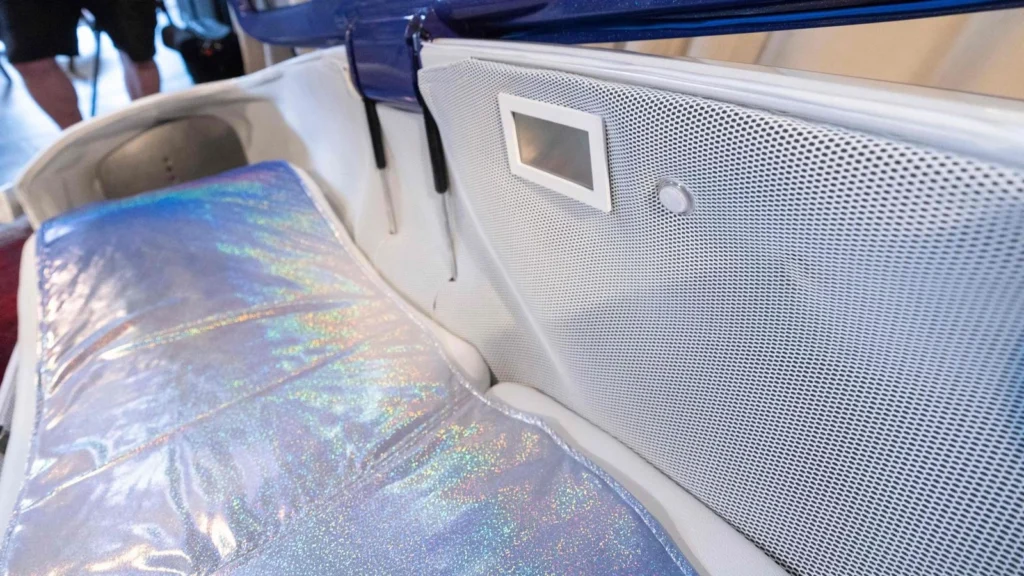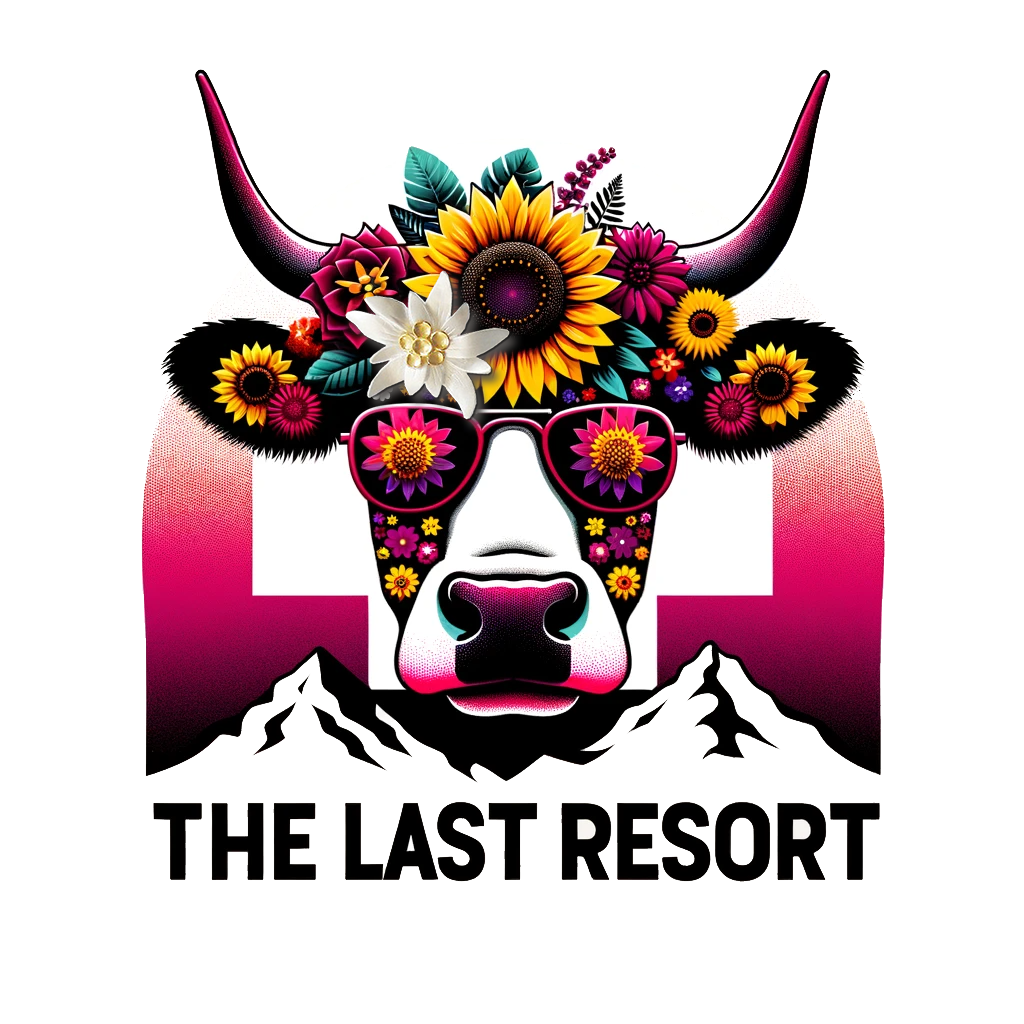Originally published in German by Berliner Morgenpost on 07.08.2024, 08:25, by Miriam Eichhorn, Freelancer.
Translated into English.

A new invention is supposed to enable people to die gently. But criticism of “Sarco” is growing louder. The initiative counters this.
In the UK, the expression “going to Switzerland” now refers to more than just a trip to the picturesque Alpine landscape. For many people suffering from incurable diseases, it symbolises the hope of a self-determined and dignified death. In Switzerland, euthanasia is legal – under certain conditions – for both Swiss citizens and foreign nationals. In recent decades, researchers in the Alpine nation have even recorded a growing “suicide tourism”.
So it is probably no coincidence that the controversial suicide capsule “Sarco” (from sarcophagus) is to be used in Switzerland for the first time – at least if its inventor, Australian euthanasia activist Philip Nitschke, has his way. The “Sarco” promises a quick and painless death through the introduction of nitrogen and the subsequent lack of oxygen.
“The ‘Sarco’ will be used in Switzerland”
Assisted suicide usually involves the use of a lethal poison (such as liquid sodium pentobarbital). This tranquilliser must be prescribed and administered by a medical professional. However, the “Sarco” does not require lethal medication. All that is required to use the suicide capsule is a psychiatric certificate confirming the person’s mental capacity.
At the touch of a button, the person in the capsule decides independently when the nitrogen should flow in. This first has a euphoric effect, then a soporific one. After a few minutes, death finally occurs “peacefully”. This can be read on the website of the associated euthanasia organisation “The Last Resort”.
According to Dr Fiona Stewart, lawyer, founding member of “The Last Resort” and wife of Philip Nitschke, Switzerland offers all the legal requirements for the use of the “Sarco”: “Switzerland pursues a universalist approach to euthanasia. For this reason, the “Sarco” will be used in Switzerland,” says Stewart in an interview with our editorial team.
Death in “Sarco” is “dignified and reliable”
The demands of “The Last Resort” include not only the right to help the dying, but also a general right to die in a self-determined way, explains Stewart: “‘The Last Resort’ advocates an approach that considers a ‘good’ death to be a universal human right. We find it problematic that people can be categorised into two groups: the deserving, who can get help to die, and the undeserving, who cannot.” Put simply: not all people have access to self-determined euthanasia.
Furthermore, unlike other suicide options, a death in Sarco is “dignified”, says Stewart: “There is nothing dignified about jumping off a tall building or in front of a train.” The fact that death occurs “reliably” also speaks in favour of using the capsule: “There is no risk of vomiting lethal medication, which can happen when taking these foul-tasting drugs. There is also no risk of the infusion line becoming blocked, as can be the case with intravenous administration of lethal medication.”
In addition, doctors would not have to take on an activity that represents a conflict of conscience for many: killing their patients. “The ‘Sarco’ stands for a demedicalisation of the dying process,” says Stewart.

Canton of Valais bans use of the “Sarco” indefinitely
However, even though “The Last Resort” and Stewart repeatedly emphasise publicly that they believe there are no legal obstacles to the use of the ‘Sarco’, several cantons have already expressed criticism of the use of the death capsule.
In the canton of Valais, the use of the suicide capsule was banned on 12 July 2024 “for preventive purposes with immediate effect and for an indefinite period”, as cantonal physician Dr Eric Masserey explained to our editorial team: “As the ‘Sarco’ device is apparently a medical device, it should normally have been approved by the Swiss federal authority Swissmedic. However, this is not the case.
As the gas used by Sarco is a special authorisation (‘off label’) for a medicine, it should normally also have been authorised by the Swiss federal authority Swissmedic or the cantonal authority. In addition to other unanswered questions, there is also the ethical question of whether such a death can be described as a ‘dignified’ death (…).” Whether and when the ‘Sarco’ could be authorised is still unclear.
Euthanasia organisations speak out against “Sarco”
Established Swiss euthanasia organisations are also openly opposed to the use of “Sarco”. “EXIT German Switzerland”, the oldest and largest euthanasia organisation in Switzerland, explains at the request of our editorial team: “For EXIT German Switzerland, this method has no significance. This is mainly due to the fact that ‘The Last Resort’ wants to remove doctors from the process of euthanasia as far as possible. (…) The cooperation with Swiss doctors, who issue the necessary prescription in specific cases, has worked reliably for years.”
“EXIT German Switzerland” also points out that sodium pentobarbital is available in Switzerland as a safe and established euthanasia drug. The members of “EXIT Deutsche Schweiz” and their relatives would also greatly appreciate being able to experience the dying process together. In the “Sarco”, on the other hand, people have to embark on their final journey alone and isolated from their loved ones.
